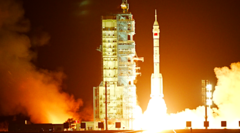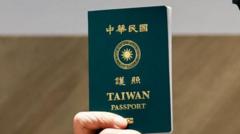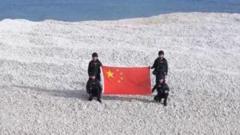As the world watches, China’s youngest astronaut crew, including its first female space engineer, embarks on a pivotal six-month mission aboard the Tiangong space station, solidifying the nation's ambitions in the ongoing space race.
China's Shenzhou 19 Mission Marks a Historic Step in Space Exploration

China's Shenzhou 19 Mission Marks a Historic Step in Space Exploration
China celebrates its successful Shenzhou 19 mission, showcasing its efforts to establish a strong presence in space exploration.
A historic moment unfolded as China's Shenzhou 19 spacecraft successfully launched, carrying a three-person crew, including the country's first female space engineer, Wang Haoze. The crew completed their docking after a journey lasting over six hours, marking the start of a six-month mission aboard the Tiangong space station where they will conduct various experiments and spacewalks. This mission is part of China's extensive plans, which include over 100 launches within a record-setting year in space exploration, all aimed at competing with the United States.
The Shenzhou 19 mission, celebrated nationwide, saw hundreds gather to bid farewell to the astronauts, known in China as taikonauts. President Xi Jinping has voiced aspirations of establishing China as a leading space power, with ambitions of landing a crew on the Moon by 2030. This intention raises apprehensions in Washington, where officials like NASA's Bill Nelson perceive China’s rapidly advancing space program as a potential military threat.
The Shenzhou 19 crew, led by seasoned pilot Cai Xuzhe and accompanied by young astronauts born in the 1990s, exuded confidence and pride. Cai emphasized their commitment to pushing the boundaries of space exploration, while Song Lingdong shared how watching earlier missions inspired him to serve his country. Their youthful perspective represents a vital investment in China's space future, with ongoing astronaut training planned for prospective lunar missions.
China's recent breakthroughs in space have garnered extensive media attention, including successful retrieval of rock and soil samples from the Moon and the deployment of its Zhurong rover on Mars. Furthermore, an ambitious satellite program is underway, aiming to rival SpaceX’s Starlink by establishing a broadband internet constellation in space.
Despite China's progress, concerns about potential military applications of its technology remain prevalent in the U.S., with officials observing an increase in China's surveillance capabilities in orbit. General Stephen Whiting of the U.S. Space Command noted the "breath-taking speed" at which both China and Russia are advancing their space investments.
Li Yingliang, a director within China's Manned Space Agency, has responded to such fears, emphasizing their commitment to the peaceful use of space and international cooperation. Nevertheless, the new space race is increasingly tied to resource exploration on the Moon, which contains valuable materials, igniting competition for potential economic benefits.
Research conducted on the Tiangong space station focuses on microgravity’s effects on human biology, exploring solutions for health issues like osteoporosis. Experts stress that findings from their missions could have valuable applications on Earth.
China's ambitions underscore the growing tension in the geopolitical landscape regarding space, as President Xi’s administration prioritizes advancements in spite of economic challenges. Nonetheless, strict security measures surround China's space program, indicating a determination to maintain confidentiality amid the increasing scrutiny of international observers.
As the rivalry between the U.S. and China extends beyond Earth, both nations prepare for a future where lunar control could dictate wealth and power, ensuring that space remains a focal point of global contention.






















